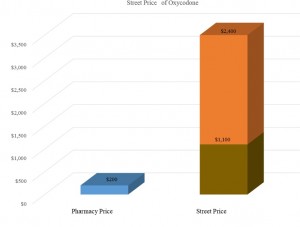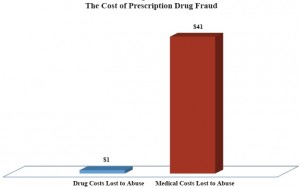Medicare Should Revoke Drug Dealers’ License to Steal!
Nearly 39 million Medicare beneficiaries, including seniors and the disabled, have subsidized drug coverage thanks to the Medicare Modernization Act (MMA) of 2003. Medicare drug plans are popular with seniors. Although subsidized by Medicare, Part D plans are offered by private insurers and compete with each other for seniors’ patronage.
When Congress passed the Medicare Part D drug program back in 2003, it inadvertently created a license to steal. Prescription drug abuse costs health plans nearly $75 billion per year — about two-thirds of it from public programs such as Medicare and Medicaid. That makes Uncle Sam the biggest illicit drug dealer in the country! Prescription drug fraud and abuse also drives up seniors’ premiums as well as boosts costs for taxpayers and health plans that administer seniors’ drugs benefits.
Questionable drug use typically involves addictive painkillers that create a heroin-like euphoria. More than 16,000 people die annually from abusing pain relievers — double the number that die abusing cocaine and heroin combined. For every death, there are 10 people admitted to a treatment program for substance abuse and 32 emergency room visits. For each person who overdoses, 130 chronically abuse prescription drugs and 825 casually use them for nonmedical purposes.
The HHS Office of the Inspector General (OIG) reports that some individuals themselves are abusing the drugs. In other cases, they attempt to obtain drugs they don’t need in order to profit by reselling them. This is especially true of narcotic pain relievers derived from opium poppy plants. Substantial numbers of narcotic pain relievers are diverted to the illicit market where their “street value” far exceeds their pharmacy costs. For instance, the OIG reports the “street” price of Oxycodone is a dozen times the normal retail price at a pharmacy. Its agents report that a bottle of Oxycodone is worth $1,100 to $2,400 per bottle if sold on the streets of Northern California.
The most common way Medicare drug fraud occurs is by “doctor shopping.” This involves seeing multiple doctors every month with bogus complaints about chronic pain. In the process, drug-seekers receive redundant exams and medical tests from each doctor and ask them to prescribe powerful pain medications. Unnecessary medical care to obtain drugs wastes far more than the cost of the drugs themselves. For every $1 worth of drugs lost due to fraud, an additional $41 is wasted for unnecessary physician visits, redundant medical tests and unnecessary ER visits to obtain the drugs.
Drug-seekers generally fill their prescriptions at multiple pharmacies to avoid detection — hoping that no one pharmacy will track their behavior and question them. This tactic often fools individual doctors and pharmacies into believing their customers are not abusing prescription painkillers or reselling them. Drug plans could easily detect drug-seeking behavior when reimbursing medical claims — that is, if they were allowed to. Federal law doesn’t grant Medicare the authority to stop it. Medicare drug plans are not allowed to restrict the benefits of enrollees thought to be abusing or reselling prescription drugs.
A bipartisan proposal in Congress would allow drug plan managers to block those who profit by stealing drugs from Medicare. Only a small percentage of Medicare drug plan enrollees abuse the system, and seniors’ benefits wouldn’t be affected. However, the con artists who make a living cheating Medicare would have to look elsewhere for an easy way to acquire narcotics to abuse or resell on the illicit market.
A program called Lock-In has already been successfully implemented in most states for Medicaid enrollees. However, it requires a change in federal law to implement in Medicare — something that Kevin Brady (R-TX), Chairman of the House Ways and Means Subcommittee on Health, supports. He recently circulated a draft bill, The Protecting Integrity in Medicare Act of 2014, to help Medicare drug plans fight back against prescription drug fraud and abuse.
Under a lock-in program, enrollees exhibiting unsafe, drug-seeking behavior — such as doctor shopping and using multiple pharmacies for getting pain medication — could be required to designate one specific doctor for pain management and one specific pharmacy to dispense pain medications. No other physician or pharmacy could prescribe or dispense pain medications — but all other Medicare benefits would remain unaffected.
It’s also good idea is consider expanding lock-in to include more drugs than just narcotic pain relievers if diversion of other types of drugs becomes a problem. A recent government investigation found Medicare spent $32 million for AIDS drugs in 2012 for 1,600 people with questionable drug utilization — more than half of which did not appear to actually have HIV. Many of these visited multiple doctors for prescriptions and/or filled their drugs at multiple pharmacies to obtain excessively-large quantities of costly HIV drugs. Some of these drugs were likely resold on the illicit market due to their high resale value. Another possibility is unscrupulous (possibly bogus) pharmacies stole Medicare enrollees’ identities and billed Medicare for drugs never dispensed.
Medicare needs the ability to lock-in troubled enrollees found to be abusing (or reselling) drugs, and shut out fraudsters billing for bogus transactions. Otherwise, the rest of us will continue to pay for the abuse.
Read more about the proposal, “Medicare Drug Plans Need the Tools to Fight Prescription Drug Fraud.”


What I find most surprising is that something that seems commonsense is even controversial. If you’re seeing multiple doctors for the same condition (e.g. chronic pain), and filling, say, five times the recommended monthly dose of narcotic pain relievers, you probably need a physician to monitor you.
This bill sounds like a great idea. It would stop wasting taxpayers’ money and catch abusers.
It is quite daunting to see the negative externalities quantified and put into perspective. The prescription drug use associated with many of the gunmen who have caused public tragedies is also worth noting. This is a grave issue of public finance and public safety.